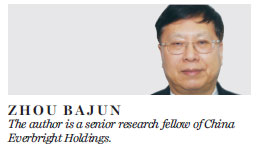HK's special place in Sino-US ties
Updated: 2015-09-29 09:59
By Zhou Bajun(HK Edition)
|
|||||||||
Zhou Bajun writes that in an era in which the global balance of power is shifting, the SAR is well-placed to foster understanding and cooperation between the superpowers
President Xi Jinping delivered a speech in the United States on Sept 22 at a welcoming dinner hosted by the Washington State governor in his honor. In addition to expressing his gratitude toward the host community for their friendship and hospitality, Xi also spoke about China's views on economic, political and cultural developments around the world. The part concerning the prospects for Sino-US relations was particularly important.
Sino-US ties are widely seen by the international community as one of the most important bilateral relationships. Since the last global financial crisis broke out in September, 2008, there have been signs - statistical data as well as unquantifiable thinking - that a profound change in the international economic, financial and political situation is occurring. The "center of gravity" is shifting from the West (Europe and North America) to the East (Asia). The shift has been accompanied by considerable debates around the world as well as in the US over Sino-US relations - described by some people as that between a rising superpower (China) and a consolidating/defending superpower (the US). One pessimistic view maintains that China and the US are bound to decide their ultimate places in the new global power structure through another world war. This negative philosophy is sometimes referred to as the "Thucydides' Trap".
Admittedly, those who subscribe to this "duel theory" are in the minority. But they seem to have gained more converts this year. The US government has been busy dealing with multiple geopolitical crises simultaneously. China has launched foreign policy initiatives such as the Asian Infrastructure Investment Bank and the "Belt and Road". At the very least many people are quite certain they have been hearing increased "saber rattling" between the US and China lately.
In his speech on Sept 22, Xi commented on this depressing issue, saying there is no such thing as the "Thucydides' Trap" unless major powers let it happen through repeated strategic misjudgments. In other words, nations create their own "Thucydides' Trap" by making the wrong decisions. He also reiterated that China is committed to joining efforts with the US in constructing a new relationship between major powers which is appropriate for the 21st century. "We wish to deepen mutual understanding of each other's strategic direction and development path with the US," Xi said.
"We need more understanding and mutual confidence to reduce mutual suspicion and avoid a strategic blunder," he added.
Can China and the US prevent a strategic misunderstanding and misjudgment which could create a "Thucydides' Trap"? There are three existing conditions which make a positive answer to this question possible. One is the growing convergence of the two countries' national interests against a backdrop of continuing economic globalization. It is important that both sides are seeking political compromise and cooperation. Another important factor to be considered is both nations possess nuclear arms and web-based aerospace military capabilities. This might help to deter future conflicts. Another factor is joint efforts by people around the world to address common challenges such as global climate change. These put our very existence at risk, but they can ensure China and the US don't damage their bilateral ties.
Hong Kong, as a special administrative region of China and a highly open economy, occupies a unique place in helping Sino-US relations develop positively.
The SAR can play a unique role as a conduit between China and the US. There is a large number of US companies and organizations in Hong Kong. Most, if not all, large US companies with investments in the mainland have regional offices in Hong Kong and rely on them to coordinate business operations in the SAR. Chinese enterprises seeking to invest in the US more often than not go through Hong Kong, for obvious reasons. The SAR is destined to play a key role in bringing Chinese and US businesses together in Hong Kong. The city can benefit by encouraging Chinese and US businesses to create win-win situations.
Hong Kong can also serve as a communication channel for China and the US to forge mutual political understanding. Two opposing political camps exist in Hong Kong with opposite objectives in relation to Sino-US ties. The opposition camp is trying to turn Hong Kong into a "Trojan Horse" designed to subvert China's political system. That does absolutely no good to Sino-US relations. The patriotic camp, especially those representing the business community, have been working diligently on showing Western business communities the real China story. They have made progress in helping the two governments avoid misunderstandings in recent years. The SAR's close links with the central government and Western economies are irreplaceable. This means Hong Kong will continue to contribute to the improvement of Sino-US ties.

(HK Edition 09/29/2015 page8)